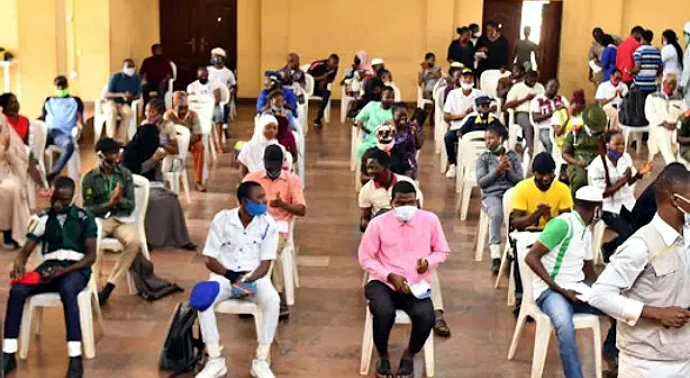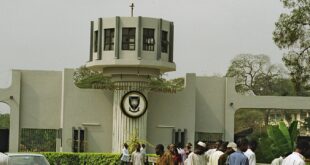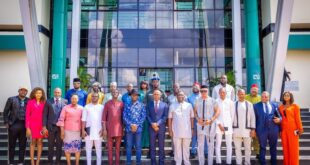Munich, Germany-based Nigerian IT specialist Kazeem Ojoye explains how technological tools help to facilitate diasporas’ transnational engagement through the use of mobile applications and online platforms to respond to the COVID-19 pandemic. He reports on how his organisation supported a state government in Nigeria in its pandemic containment efforts.
——–
Diaspora is a term used to refer to the expatriate population abroad and the new generation born abroad who may be citizens of their country of residence. They often form a community of individuals in foreign countries, dispersed across several nations, who maintain an affiliation to their country of origin. They have always been contributing to the development of their home countries, either through the private or the public sectors. They assist through remittances, direct investment, invention, and philanthropic contributions, amongst others.
According to the United Nations Population Division estimates, the number of people living outside their country of origin as of 2020 was 281 million, which represents 3.6% of the world population; while the remittances to low and medium-income countries (LMICs), as of 2019, was at $554 billion. It has been estimated that remittances to LMICs will recover and raise to $470 billion in 2021 after its drop-down in 2020 to $445 billion.
Remittances have been a major lifeline and have an enormous impact on the economies at home as they are used to assist families to afford good food, access healthcare facilities, establish small and medium enterprises and cover their basic needs. Remittances have been particularly helpful to ease the socio-economic impact of the pandemic.

Over time, technology and online platforms have been used to get information about the host country and connect with other immigrants. It also helps to transfer ideas (social remittances), where migrants are engaged in social or political activism to create awareness about their country of origin in their host country and raise funds to support communities in their country of origin.
Technology has facilitated globalisation. Immigrants connect with each other to decide how they can be of assistance to their home countries, especially when it comes to matters of urgency. This engagement would not be possible if there was no way to connect between migrants across the world. With the advent of technology, the level of diasporic engagement has improved. Technological tools such as mobile gadgets, blogs, teleconferencing apps, social media, help facilitate transnational engagement to maintain a sense of national identity and to foster relationships.
In Nigeria, blogs were used during the pandemic as a tool to post articles and share relevant information so as to keep people updated on what was happening globally and the progress made in curbing the spread of the pandemic. Teleconferencing apps such as Zoom, Google Meet, Skype and the likes were being used to organise seminars to enlighten people, and social media was used as a means of disseminating information and improving engagement.
Diasporas, as part of their philanthropic contribution, responded to the COVID-19 pandemic by providing food, organising sensitisation seminars on basic hygiene to curb the spread of the virus, providing relief palliatives, paying for online courses for university students, and supporting educational programmes that aired on television, radio stations and also on some social platforms where students were taught core subjects so as to make sure they kept learning even while away from schools (see figure 2 below).
In a bid to step in and assist the Nigerian Diaspora Movement during the pandemic, the African Youth Enlightenment Empowerment and Self-Sustainability Initiative (AYEESSI), an international organisation that focuses particularly on youth enlightenment and empowerment, made contributions and responded to the pandemic by partnering with the Oyo State Government, Nigeria, They helped with public sensitisation and distribution of relief items and hand sanitisers to the residents of Oyo state so as to create more awareness about the virus and to provide materials to help curb its spread in the state and country as a whole (see figure 1 below.) Also, the organisation created a programme tagged ‘Acknowledging Real Talent’ (ART) which is a show that exposed the Nigerian youths to different trainings such as artificial intelligence, design thinking, amongst others to develop the youth’s technological competences. The participants also got to sharpen their skills in interpersonal relationships and communication, amongst others.
—————
Kazeem Ojoye, the founder of the African Youth Enlightenment Empowerment and Self-Sustainability Initiative (AYEESSI), was born in Nigeria but moved in the early 90s to Germany, where he pursued his secondary and higher education. His passion for charity and for enlightening and empowering as many Nigerian youths as possible made him found AYEESSI. He is a 2-term ex-Financial Secretary of the Nigerian Diaspora Organization Germany (NIDOG) and the present Chairman in Bavaria, Germany, since 2020.
This article is part of the issue ‘Empowering global diasporas in the digital era’, a collaboration between Routed Magazine and iDiaspora.
 THE AFRICAN COURIER. Reporting Africa and its Diaspora! The African Courier is an international magazine published in Germany to report on Africa and the Diaspora African experience. The first issue of the bimonthly magazine appeared on the newsstands on 15 February 1998. The African Courier is a communication forum for European-African political, economic and cultural exchanges, and a voice for Africa in Europe.
THE AFRICAN COURIER. Reporting Africa and its Diaspora! The African Courier is an international magazine published in Germany to report on Africa and the Diaspora African experience. The first issue of the bimonthly magazine appeared on the newsstands on 15 February 1998. The African Courier is a communication forum for European-African political, economic and cultural exchanges, and a voice for Africa in Europe.













